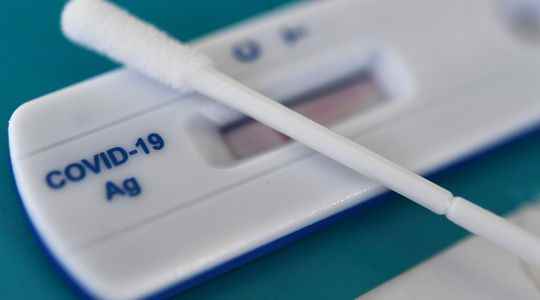Reinfections linked to Covid-19 have become commonplace, so much so that we no longer ask if a person has been infected with the virus, but how many times they have contracted it. But does this mean that reinfection is risk-free? A large American study, published Thursday, November 11 in the journal NatureMedicine, tries to answer the question. The conclusion of this work led by Dr. Ziyad Al-Aly of Washington University School of Medicine in St. Louis and his colleagues shows that reinfection with SARS-CoV-2 doubles the risk of death and triples those of hospitalization and heart problems.
Yannick Simonin, virologist and lecturer at the University of Montpellier, greets L’Express with this “first interesting large-scale study on the risk of reinfections”. To arrive at this result, the American researchers analyzed the anonymous medical records of 5.8 million people in the National Health Care Database of the United States Department of Veterans Affairs. More than 443,000 people tested positive for Covid at least once between March 1, 2020 and April 2022. Of these, 41,000 had Covid more than once. In detail, more than 93% had two infections, while 6% had three and almost 1% had four. The remaining 5.3 million have never contracted Covid.
When the researchers compared the health outcomes of the different groups, they found that “people who were reinfected had an increased risk of all sorts of unwanted health problems,” Ziyad Al-Aly told AFP. The sequelae identified by the study are numerous, including pulmonary, cardiovascular, hematological, diabetic, gastrointestinal, renal, mental, musculoskeletal and neurological disorders. The researchers observe long-term impacts such as neurological deficits or cardiological problems. “This is important information, even if you are vaccinated and previously infected, you should not take the infection lightly”, comments Yannick Simonin.
Different reinfections, depending on the viral diseases
The study specifies that these risks appear more pronounced at the time of infection, and up to six months later. Vaccinated as well as non-vaccinated individuals are concerned. Specifically, the work reveals that the risk of complications was lower in people with one infection, increased in those with two infections and was higher in patients with three or more infections. However, Dr. Celine Gounder, an infectious disease epidemiologist and editor of Kaiser Health Newsadded in Reuters that there appeared to be a “ceiling effect with multiple infections”, with fewer jumps in risk after the second infection.
Depending on the viral illnesses, reinfections can be more or less serious. “Some provide persistent immunity over a very long time, like measles and smallpox,” says Yannick Simonin. Conversely, the flu returns every year with a health burden that varies from year to year. Do reinfections linked to this respiratory disease increase the risk of complications? “There is no study at this level, because these results are not easy to obtain. We need strong statistical analyzes that can only be obtained on a very large number of cases”, answers the specialist. Unlike the flu, Covid-19 has a large number of variants, which have become the authors of successive waves at intervals of two or three months.
“With Covid-19, we are faced with different variants which develop mutations which allow them to bypass our immune system. It is more an escape from the immune system than destruction”, warns Yannick Simonin. In other words, when people are reinfected by the virus, it is as if, for some, they were contaminated by a new virus, because their immune system does not control this infection. So what will happen with the new vaccines against Omicron, the variant that causes the most reinfections, available since October 3? “According to the data that are beginning to arrive, the antibody rate would be higher with these new vaccines, but other studies should be carried out. The truth of one day is not that of tomorrow”, cautiously advances the researcher .
An insufficiently representative sample
If these conclusions have been taken up by many media, beware of misunderstandings: they should not be interpreted as an assessment of the severity of a second infection compared to that of a first infection. That being said, some specialists point the finger at the lack of representativeness of the human sample used for the study “which has strengths and limitations”, according to Yannick Simonin. Indeed, the database on which this work is based is made up of 90% white men over the age of 40, which is not representative of the American population.” This is a cohort of former soldiers whose average age is higher than that of the general population, they are therefore more fragile”, recalls the virologist. Another limitation noted by the specialist, the study does not say whether the risks change according to the variants.
One thing is certain according to Yannick Simonin: “Thanks to vaccines and previous infections, fewer people are at risk of being reinfected, but the latter have a greater risk of developing serious forms.” Last bias: the study focuses on patients who develop symptoms. Thus, reinfected and asymptomatic people therefore went unnoticed in this study. This is clarified in a long thread, on Twitter, Health Nerd, US epidemiologist: “It is possible that people who have had mild reinfections are not captured in this dataset at all.” If the study presents some biases, it makes a new contribution concerning the long-term effects of infections linked to Covid-19.
